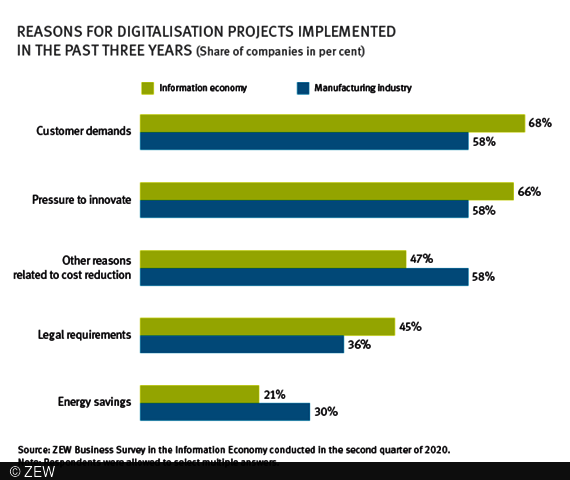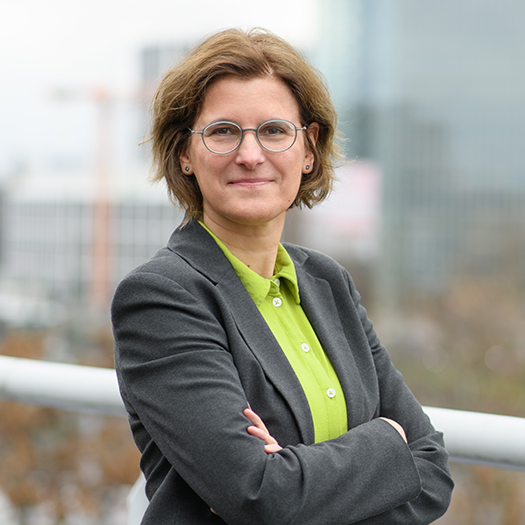Potential of Digital Technologies for Greater Energy Efficiency Remains Untapped
ResearchBusinesses have so far been rather hesitant to introduce digital technologies that reduce energy consumption, although there are many ways to apply these technologies. Only one third of companies in the manufacturing sector and around 20 per cent of companies in the information economy cited energy savings as a reason for implementing digitalisation measures. These are some of the findings of a study on digitalisation and energy efficiency published today, which was conducted by ZEW Mannheim together with IW Consult and the Institute for Industrial Management FIR at RWTH Aachen University on behalf of the Federal Ministry for Economic Affairs and Energy.
“Especially small and medium-sized enterprises tend to lag behind when it comes to energy efficiency and digitalisation. Both the overall dissemination of measures to optimise energy consumption and the use of digital technologies can help boost energy efficiency. However, these measures are less common in small and medium-sized enterprises than in large corporations,” explains Professor Irene Bertschek, head of the Research Department “Digital Economy” at ZEW Mannheim and co-author of the study. In the information economy, for instance, 49 per cent of large enterprises (100 or more employees) have implemented measures targeted at improving their energy balance in the past three years. In medium-sized enterprises (20–99 workers) this share was 31 per cent, and in small companies (<20 employees) only 21 per cent. In the manufacturing sector, 85 per cent of large companies, 58 per cent of medium-sized and 42 per cent of small enterprises stated to have adopted measures to improve their energy balance.
The fact that measures to improve energy efficiency generally pay off can be illustrated by taking a closer look at the energy consumption of businesses: Around one third of companies that implemented targeted measures to increase energy efficiency saw a fall in total energy consumption. For companies without targeted measures, this share was only 14 per cent in the information economy and ten per cent in the manufacturing industry.
Digitalisation requires energy
“While digitalisation can help improve energy efficiency, its implementation itself also consumes energy. Businesses should take this into account when planning digitalisation measures. The results of the survey show that there is still considerable room for improvement when it comes to employing information technologies in an energy-efficient way,” explains Dr. Mareike Seifried, researcher at ZEW Mannheim and co-author of the study. In the past three years, 59 per cent of companies in the information economy and 53 per cent of businesses in the manufacturing industry have invested in energy-efficient hardware. Another measure to increase energy efficiency in the area of information technologies is the use of cloud technologies. Cloud computing centres are usually equipped with the latest hardware technologies, and they benefit from economies of scale. In the information economy, 30 per cent of companies have used their own company servers and 41 per cent external servers for cloud technologies in the past three years. With shares amounting to 27 and 29 per cent, respectively, the proportion of companies using cloud computing is slightly lower in the manufacturing industry. However, measures to improve the energy efficiency of in-house data centres and server rooms were taken less frequently in both sectors, with 24 per cent of companies in the information economy and 20 per cent in manufacturing industry.
In addition to the survey results, the study also contains an overview of the current state of research as well as examples from practice. “Both research and practice show that there is a need to catch up in terms of availability and processing of energy data in order to exploit the potential of digital technologies for increasing energy efficiency,” says Professor Irene Bertschek.
About the study
The study is part of a comprehensive research project on digitalisation, which has been undertaken on behalf of the Federal Ministry for Economic Affairs and Energy with an initial duration of three years. The project, which is entitled ‘Measuring the degree of digitalisation in the German industry’ is conducted by a consortium formed by ZEW Mannheim (consortium leader), the Cologne-based German Economic Institute (IW), IW Consult, the Institute for Industrial Management FIR at RWTH Aachen University, and the German Institute for Economic Research (DIW).

